|
|
|
Sort Order |
|
|
|
Items / Page
|
|
|
|
|
|
|
| Srl | Item |
| 1 |
ID:
148267
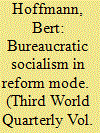

|
|
|
|
|
| Summary/Abstract |
Standard wisdom explains Cuba’s current transformation as one of economic change but political immobility. However, Cuban politics have also undergone a major change since the handing over of power from Fidel to Raúl Castro – even if the rhetoric used has been one of continuity. This article traces this process by looking at four areas: the depersonalisation and re-institutionalisation of the political structures; the diversification of the public sphere, particularly through the use of digital media; the liberalisation of travel and migration, with its transformative impact on state–citizen relations; and the turn to a moderate foreign policy, as highlighted by the rapprochement with the USA, with its implications for legitimising the underpinnings of Cuban socialism. Although the shift has been well below the threshold of a transition to multiparty democracy, Cuba has evolved from the charismatic model of the past to what can be understood as bureaucratic socialism in reform mode.
|
|
|
|
|
|
|
|
|
|
|
|
|
|
|
|
| 2 |
ID:
148260
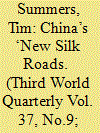

|
|
|
|
|
| Summary/Abstract |
This paper argues that the Chinese government’s ‘belt and road’ initiative – the Silk Roads vision of land and maritime logistics and communications networks connecting Asia, Europe and Africa – has its roots in sub-national ideas and practices, and that it reflects their elevation to the national level more than the creation of substantially new policy content. Further, the spatial paradigms inherent in the Silk Roads vision reveal the reproduction of capitalist developmental ideas expressed particularly in the form of networks, which themselves have become a feature of contemporary global political economy. In other words, the Silk Roads vision is more of a ‘spatial fix’ than a geopolitical manoeuvre.
|
|
|
|
|
|
|
|
|
|
|
|
|
|
|
|
| 3 |
ID:
148262


|
|
|
|
|
| Summary/Abstract |
Cuba, this iconic revolutionary island which has brought so much hope to the Third World and, at one point, worry for a nuclear World War III, is going through a process of change never seen since Fidel Castro led his revolutionary forces to triumph around New Year’s of 1959. Yet, 10 years into the change process, led by the younger Castro Raúl (now 85), nobody can really forecast where the country will end up in socio-economic and political terms. In this TWQ subsection, two economists and three political scientists – two Cubans and three European Cuba watchers – analyse the reforms and their possible outcome.
|
|
|
|
|
|
|
|
|
|
|
|
|
|
|
|
| 4 |
ID:
148264
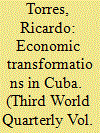

|
|
|
|
|
| Summary/Abstract |
After Raul Castro’s accession to the presidency of Cuba, the country has witnessed the most far-reaching process of economic reforms for more than five decades. The government has expanded the private and cooperative sectors, has passed a new foreign investment law, restructured most of its old debt and has sought to end the long-standing dispute with the USA. Yet economic performance has been poor and the country faces significant challenges and contradictions arising from the reforms. This paper analyses the macroeconomic environment and the changes introduced by the Cuban government over the period 2007–15. While successful at restoring macroeconomic equilibria, restrictive macroeconomic policies have hurt economic growth, whereas growth- and efficiency-enhancing measures are yet to produce results. Moreover, transformation of the economic model is slow because of its many internal contradictions. The paper also discusses some of the main impediments to future change.
|
|
|
|
|
|
|
|
|
|
|
|
|
|
|
|
| 5 |
ID:
148259


|
|
|
|
|
| Summary/Abstract |
In 2000 the city of Johannesburg adopted the vision of becoming a World Class African City (WCAC). Since then Johannesburg has been energetically promoted in accordance with this vision. The tagline ‘world-class African city’ is now used in the branding of the city. It has become a major signifier on its logo and a notable catchphrase in its radio adverts of its brand. However, the nested opposition of the ‘world-class’ and ‘African’ discourse has not been explicitly defined in the vision beyond their simplistic connection. Many people have found the vision puzzling and some have questioned its claims. This paper explores the conundrum that lies in the nested opposition of the ‘world-class’ and ‘African’ discursive currents. It identifies the ‘global’ and ‘local’ discursive forces (in the country) which were formative in the creation of the vision. It looks at how the intersection of global and African discursive fronts has become leverage for generating hybrid cultural/cosmopolitan identities. The thrust of the paper is that the urban practices and landscapes of post-apartheid Johannesburg are enacted and re-enacted together with the inspiration, signification and/or representation of the city vision.
|
|
|
|
|
|
|
|
|
|
|
|
|
|
|
|
| 6 |
ID:
148265
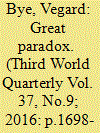

|
|
|
|
|
| Summary/Abstract |
US–Cuban normalisation currently taking place. The rapprochement process, culminating with President Obama’s historic visit in March 2016, has unleashed stiff resistance in both countries. The liberal democratisation paradigm is held up against what we have termed ‘socialist neo-patrimonialism’, with both seen as alternative tools for assessing the direction of social transformations underway in Cuba, focusing on the debate about the role of the national private sector. Paradoxically, normalisation with the USA may so far have had the contrary effect of what President Obama had in mind in this respect: judging from the 7th Congress of the Communist Party in April 2016, it seems that resistance against economic reforms has hardened, caused by a fear that Obama’s charm offensive, combined with a strengthened entrepreneurial sector, will undermine the entire revolutionary project. The article concludes with a discussion of four development scenarios.
|
|
|
|
|
|
|
|
|
|
|
|
|
|
|
|
| 7 |
ID:
148255
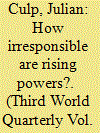

|
|
|
|
|
| Summary/Abstract |
Rising powers like Brazil, China and India have recently made significant gains in their capabilities as states. Therefore many IR scholars are claiming that these powers must now contribute more to the provision of global public goods like a clean environment, free trade and human rights. This article will argue that reasonably democratic international political discourses are another global public good whose greater supply is sorely needed and that rising powers are having a positive impact on the creation of such discourses. Thus rising powers are not behaving as irresponsibly as many IR scholars assume.
|
|
|
|
|
|
|
|
|
|
|
|
|
|
|
|
| 8 |
ID:
148261


|
|
|
|
|
| Summary/Abstract |
In his 1966 essay ‘A Report from Occupied Territory’, James Baldwin wrote that ‘occupied territory is occupied territory, even though it be found in that New World which the Europeans conquered’. Though written 50 years ago, Baldwin’s observations continue to resonate, indicating historical trends across geographical experiences affected by the legacy of colonialism. A growing theme in development and peace building studies relates to a kind of boundary crossing that sees academics and activists drawing linkages across spatial and temporal divides. The situation in Palestine–Israel has taken an increasingly central role in mobilising transnational solidarities that cross such boundaries. By examining James Baldwin’s analysis of Harlem’s ‘occupation’ – as well as drawing from a range of voices such as Achille Mbembe, Frantz Fanon, Edward Said, Toni Morrison and Laleh Khalili – this paper will explore the shared experiences of racism, colonialism, military occupation and dispossession that separate and divide, and the possibilities for transnational solidarities that defy those separations.
|
|
|
|
|
|
|
|
|
|
|
|
|
|
|
|
| 9 |
ID:
148263


|
|
|
|
|
| Summary/Abstract |
Why do some authoritarian regimes abruptly collapse, whereas others display remarkable resilience and durability? This article addresses one particularly striking example. Why did the Batista regime in Cuba unexpectedly and suddenly disintegrate in 1958 under challenge from the small guerrilla force that Fidel Castro had established in the Sierra Maestra, whereas – over half a century later – the Castro regime has not only survived as the most long-lasting system of personalist rule in existence but has actually displayed a plausible capacity to perpetuate itself after the inevitably approaching death of its founders?
|
|
|
|
|
|
|
|
|
|
|
|
|
|
|
|
| 10 |
ID:
148258
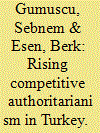

|
|
|
|
|
| Summary/Abstract |
Since the Justice and Development Party (AKP) came to power in 2002 Turkey has undergone double regime transitions. First, tutelary democracy ended; second, a competitive authoritarian regime has risen in its stead. We substantiate this assertion with specific and detailed evidence from 2015 election cycles, as well as from broader trends in Turkish politics. This evidence indeed confirms that elections are no longer fair; civil liberties are being systematically violated; and the playing field is highly skewed in favour of the ruling AKP. The June 2015 election results and their aftermath further confirm that Turkey has evolved into a competitive authoritarian regime.
|
|
|
|
|
|
|
|
|
|
|
|
|
|
|
|
| 11 |
ID:
148266
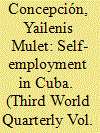

|
|
|
|
|
| Summary/Abstract |
This article discusses the phenomenon of self-employment in Cuba from three perspectives: its conceptualisation, its links with informality and the challenges to its growth. First, it reviews the characteristics of self-employment in Cuba, in comparison with available theory and with various studies of informality carried out in other countries. Second, it documents the dimensions of informality and Cuba’s black market economy through the study of a specific sector of the independent labour force: shoe producers. Third, it considers the main challenges for the growth of self-employment in Cuba, as illustrated by the case of Cuban shoemakers, and draws some lessons that should improve the situation of this sector, taking into account different international studies.
|
|
|
|
|
|
|
|
|
|
|
|
|
|
|
|
| 12 |
ID:
148256
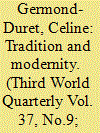

|
|
|
|
|
| Summary/Abstract |
The debates over Indigenous peoples and development are often framed within the discussion on the shift towards modernity, the imposition of economic liberalism and resistance against external interventions, with a tendency to see Indigenous peoples as a possible alternative to the world economic order. However, looking at many development agencies’ discourses, the idea that Indigenous peoples will actually benefit from modernity prevails. The literature is divided along these two conflicting views and dominated by binary oppositions: traditional/modern; backward/advanced; sustainable/unsustainable, etc. This article discusses the tradition/modernity dichotomy and raises the following questions: is it relevant to think in terms of modernity/tradition in the case of Indigenous peoples? What does the use of such a dichotomy imply? What is the alternative? The article demonstrates that this binary opposition is neither relevant nor desirable, and that a new analytical framework is required. Instead, it proposes using a normalisation framework, which focuses on the attempts made to ‘normalise’ Indigenous peoples and to encourage them to comply with existing social and economic models.
|
|
|
|
|
|
|
|
|
|
|
|
|
|
|
|
| 13 |
ID:
148257
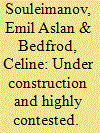

|
|
|
|
|
| Summary/Abstract |
While scholarship on Islam in the Caucasus has focused on the late Soviet religious revival – the rise of Salafi jihadism and religious radicalisation in the northern part of these strategic crossroads – no study to date has addressed the discursive struggle over the social functions of regional Islam. This article deconstructs these discourses in order to examine the very varying, and often conflicting, representations of Islam advocated by various actors across the region and within particular republics. The article highlights the contested functions of regional Islam against the background of a religious revival that is still a work in progress.
|
|
|
|
|
|
|
|
|
|
|
|
|
|
|
|
|
|
|
|
|